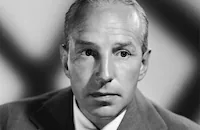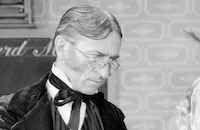Paramount’s B movies of the early 1940s were among Hollywood’s strongest at the time, and Buy Me That Town, with a plot later characterized by film scholar William K. Everson as “Damon Runyon characters combined with Frank Capra sentiment,” is a fine case in point.
An unpretentious and fast-moving comedy, its story follows two gangsters, Rickey Deane and Louie Lanzer, who take a break from their life of crime after their boss, Chink Moran, is drafted into the army. Driving through Connecticut, they are pulled over for speeding, brought before a judge and fined an exorbitant sum. Refusing to pay it, they are put in jail, where they learn that the town is bankrupt and has resorted to issuing hefty fines as the only way to raise revenue. Sensing an opportunity to make money, Rickey and Louie decide to buy the town and turn the jail into a country-club-like haven for fugitives evading serious crimes elsewhere; they can now be arrested on minor charges and “jailed” at $1000 per week, safe from serious prosecution. Meanwhile, Rickey and Louie bring on their fellow former thugs to help run the town. Their arsonist becomes fire chief; their safecracker becomes Chief of Police; and so on. In their new, legitimate jobs, they gradually start to reform – but then Chink returns.
Buy Me That Town is one of several films from the early 1940s that feature gangster characters discovering patriotism and on some level reforming; other examples include Alan Ladd in Paramount’s Lucky Jordan (1942) and Humphrey Bogart in Warner Bros.’ All Through the Night (1942). Three first-time writers penned this story (which was turned into a screenplay by Gordon Kahn), but only one, Martin Rackin, went on to a significant screenwriting career. He later wrote such classics as The Enforcer (1951) and The Horse Soldiers (1961), and in the early 1960s he became head of Paramount production.
Producer Sol C. Siegel assembled a cast of enjoyable character actors to bring the screenplay to life. To play Rickey, he borrowed Lloyd Nolan from Fox, where the actor was then in the midst of his run of Michael Shayne detective mysteries. Nolan was joined by excellent players Albert Dekker, Sheldon Leonard, Ed Brophy, Warren Hymer, and Horace MacMahon. While leading lady Constance Moore never achieved the stardom she deserved, she brightened many a B picture, including this one, over her decades-long feature film career.
Siegel also borrowed from Fox the veteran B-film director Eugene Forde. The smoothness of the resulting film is emblematic of William K. Everson’s observation that “Siegel’s Paramount productions were right on the borderline between A and B pictures, and sometimes the margins would blur to the point of indistinguishability.”
Buy Me That Town shot in the early spring of 1941 and was released that October as the second feature to Paramount’s Bob Hope comedy Nothing but the Truth. Both drew strong reviews from The New York Times. Trade paper Variety was downright effusive, deeming the film “one of the most entertaining B entries of the season... A laugh-provoking burlesque of gangsterism... Eugene Forde has directed to obtain an unbelievably speedy pace... It will serve as an excellent supporter in the duals.”
SOURCES:
AFI Catalogue of Feature Films
Don Miller, “B Movies”
William K. Everson Collection program notes, accessed at wke.hosting.nyu.edu/wke



























